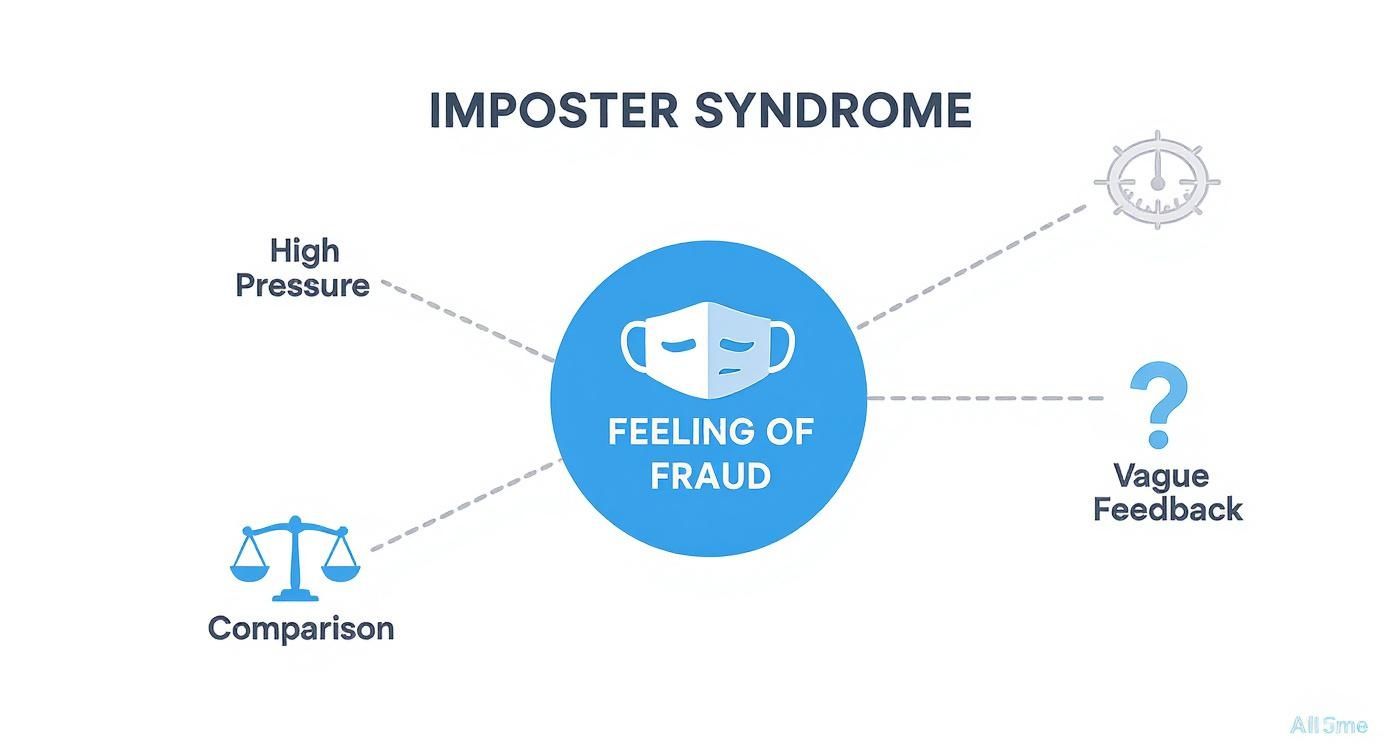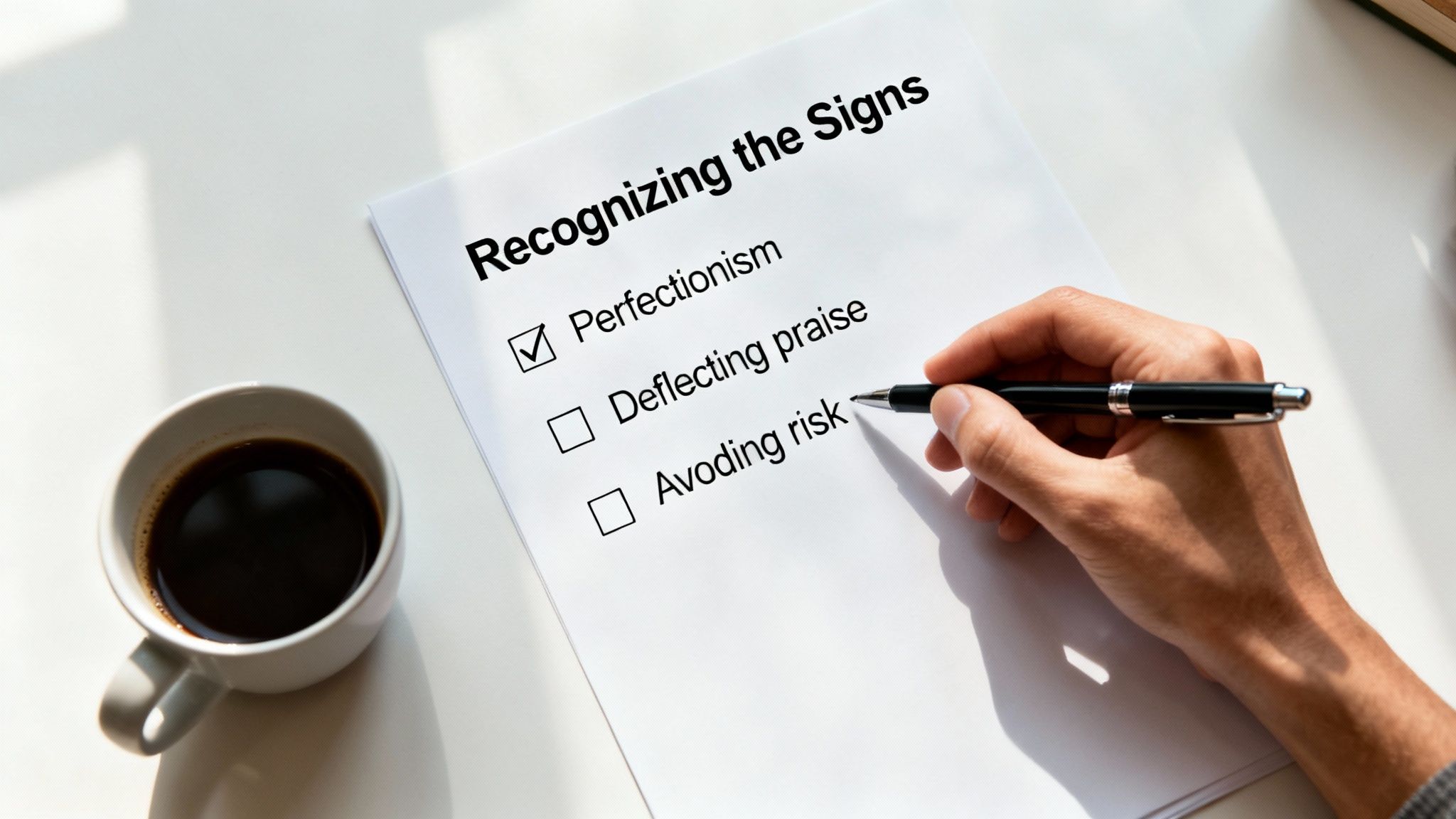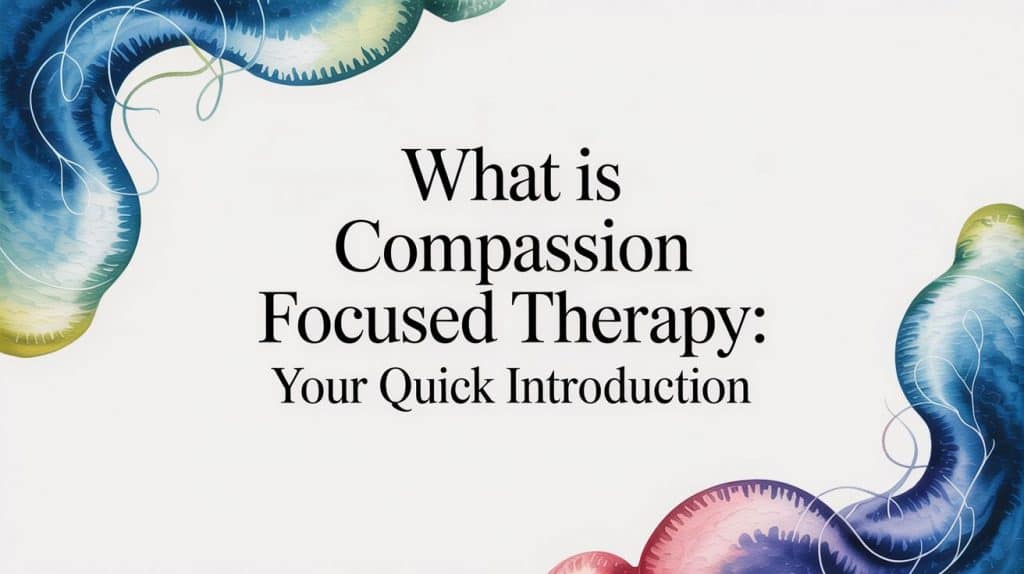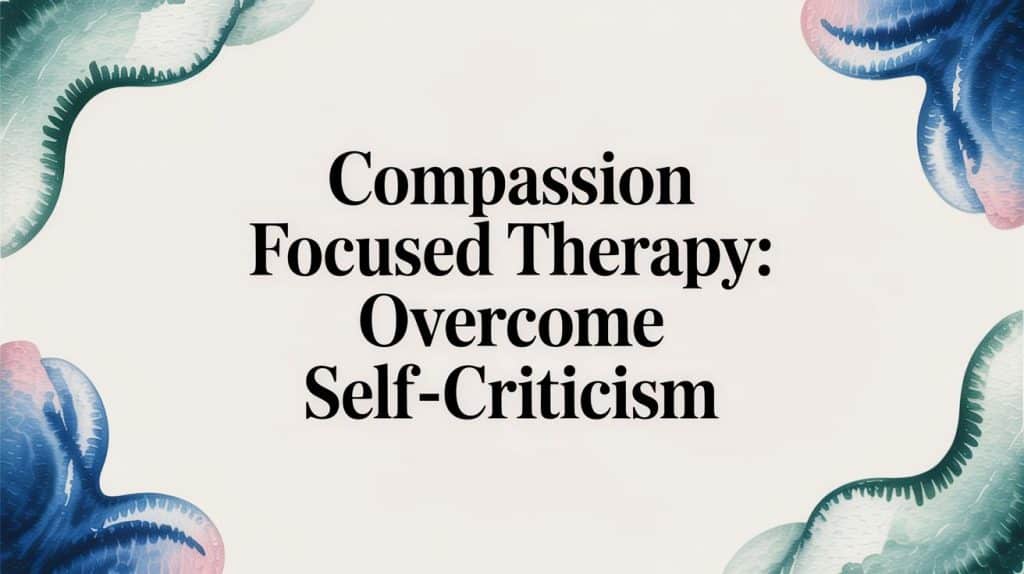Ever found yourself in a meeting, glancing around the room and thinking, “Everyone here is brilliant… and I’m just waiting to be found out”? That sinking feeling, the quiet voice that whispers you’re a fraud, is the heart of imposter syndrome at work.
It’s this persistent, nagging belief that you’ve somehow tricked everyone into thinking you’re competent. No matter how many projects you nail or how much praise comes your way, you’re convinced your success is down to luck, timing, or a mistake. Sooner or later, you believe, everyone will discover you don’t really belong.
If this sounds familiar, you’re in good company. This isn't some rare personal failing; it's an incredibly common experience. A recent UK study revealed that 62% of adults have felt like an imposter at work in the last year alone. For professionals aged 18-34, that figure skyrockets to a staggering 86%.
So, what's going on here? Why are so many of us feeling this way?
The Workplace Conditions That Feed Self-Doubt
While the feelings are internal, the roots of imposter syndrome often grow in the soil of our work environment. Certain company cultures don’t just allow self-doubt to exist; they actively fertilise it, turning a tiny seed of uncertainty into a full-blown crisis of confidence.
Think of it this way: your internal feelings are a plant, and the workplace is the garden. Is the garden nurturing, or is it creating the perfect storm of conditions for weeds of self-doubt to thrive?
This infographic breaks down how key workplace factors—like intense pressure, constant comparison, and a lack of clear feedback—can combine to make you feel like you're faking it.

As you can see, imposter syndrome is rarely a solo act. More often than not, it’s a perfectly normal human reaction to a challenging, and sometimes dysfunctional, environment.
Let's dig into the most common triggers and why they have such a powerful effect on us. The table below breaks down the key drivers that can make even the most competent person feel like an imposter.
Key Drivers of Imposter Syndrome in the Workplace
| Workplace Driver | How It Contributes to Imposter Feelings | Example Scenario |
|---|---|---|
| High-Pressure Environments | Relentless deadlines and high stakes leave no room for error. A single small mistake can feel like irrefutable proof of your incompetence, reinforcing the belief you're not cut out for the job. | You miss a minor detail in a report. Instead of seeing it as a simple oversight, you interpret it as confirmation that you're not detail-oriented enough and will soon be exposed. |
| A Culture of Constant Comparison | Workplaces that publicly rank employees or constantly spotlight "top performers" create a competitive, zero-sum game. A colleague's success can feel like a direct reflection of your own failure. | A colleague is praised in a team meeting for landing a big client. Your first thought isn't "Great for them!" but "Why wasn't that me? I'm clearly falling behind." |
| Vague or Infrequent Feedback | Without clear, constructive guidance on your performance, it's easy to fill the silence with your own harsh inner critic. You're left guessing, and the imposter mindset always assumes the worst. | Your manager says "good job" after a major project, but offers no specific details. You're left wondering what was actually good and what you could improve, so you assume they were just being polite. |
These triggers are so effective because they tap directly into our fundamental human needs for competence and belonging. They create an environment where it feels unsafe to be anything less than perfect.
This pattern of self-criticism is deeply tangled up with feelings of shame. When we believe we are fundamentally flawed or 'not good enough', we internalise these external pressures as deep, personal failures. A powerful way to counteract this is by understanding how to manage shame and self-criticism through self-compassion.
Realising that your work environment plays such a huge role is the first step toward taking back control. It shifts the question from a self-blaming "What's wrong with me?" to a more curious and constructive "What factors here are making me feel this way?"
This change in perspective is everything. It's the key that unlocks the door to building real, effective strategies to fight back against that fraudulent feeling—which is exactly what we’ll explore next.
Recognising the Signs of Imposter Syndrome

Imposter syndrome at work isn't just one single feeling. It’s a messy, complex pattern of thoughts and behaviours that show up in very specific, often subtle ways. In fact, it often hides behind habits we might easily mistake for simple diligence or humility, which is what makes it so tricky to spot.
But once you know what you’re looking for, these patterns become much clearer.
Think of these signs less as symptoms and more as internal scripts that run on a loop in the workplace. They are the day-to-day expressions of that deep-seated fear of being found out. Recognising these scripts in your own behaviour is the first, most powerful step toward rewriting them.
Let’s look at some of the most common ways imposter syndrome tends to show up at work. See if any of these feel a little too close to home.
Perfectionist Paralysis
This is one of the big ones. It’s the belief that your work must be 100% flawless, all of the time. Anything less than perfect feels like a catastrophic failure and, more importantly, concrete proof of your incompetence.
This goes way beyond having high standards; it’s about setting a bar so impossibly high that it causes crippling anxiety and, ironically, leads to procrastination. You might find yourself spending three hours tweaking a single PowerPoint slide or re-reading a simple email a dozen times before you dare hit 'send'. The fear of making a mistake becomes so huge that it can stop you from starting—or finishing—your most important work.
Workplace Vignette: The Presentation Polish
Amelia is leading a project update next week. She has all the data and a solid draft, but she spends an entire weekend reformatting charts and rewording sentences. Her partner asks why she's so stressed, and she replies, "If there's a single typo, the entire leadership team will think I'm careless and question why I was ever given this responsibility."
The Compliment Deflection Reflex
When someone praises your work, what’s your immediate gut reaction? If it’s to brush it off, you might be dealing with this classic sign. Instead of absorbing positive feedback, you find a way to attribute your success to anything but your own skill.
This isn’t just being modest; it’s a genuine, deep-down belief that you don’t deserve the credit. You might say things like, "Oh, it was just luck," or "Anyone could have done it," or "I had a lot of help." While teamwork is of course important, this reflex systematically erases your personal contribution and reinforces the narrative that you’re a fraud who just got lucky this time.
Downplaying Your Expertise
People struggling with imposter feelings often believe they need to know everything about a subject before they have the right to contribute. They live in fear of being asked a question they can’t answer, seeing it as a moment of public exposure that will reveal their fraudulent status.
This tends to show up in a few key ways on the job:
- Reluctance to speak up: You stay quiet in meetings, even when you have valuable insights, because you aren't 100% certain you're correct.
- Over-preparing: You feel a compulsive need to memorise every possible fact before a presentation, turning preparation into an overwhelming, exhausting task.
- Avoiding opportunities: You might turn down a chance to lead a project or present your findings because you don’t feel like "the expert" in the room.
This behaviour doesn't just hold you back; it stifles your growth and prevents your colleagues and leaders from seeing what you’re truly capable of. It keeps you playing small, which only reinforces the belief that you don’t belong at a higher level.
The core issue here is an extremely rigid definition of what it means to be competent. You believe true competence means knowing everything, being flawless, and never needing help. This all-or-nothing thinking is a hallmark of the imposter cycle.
Learning to identify these patterns is like turning on a light in a dark room. All of a sudden, you can see the obstacles for what they truly are—not as evidence of your inadequacy, but as tangible habits and thought patterns you can begin to challenge and change.
The Hidden Costs of Imposter Syndrome in Business

While the fight against imposter syndrome feels deeply personal, its impact isn't contained to one person's mind. It ripples outwards, leaving behind tangible, measurable costs for the entire organisation.
This isn't just about individual self-doubt. It's a quiet but corrosive force that eats away at personal wellbeing and, ultimately, the company's bottom line. When good people feel like frauds, they start acting in ways that directly hit productivity, innovation, and retention.
For the individual, the cost is immediate. The constant pressure to be perfect and the ever-present fear of being exposed leads to a state of chronic stress. It’s more than just a bad day; it’s a relentless internal battle that drains mental and emotional reserves, making burnout almost inevitable.
This internal turmoil often creates a tragic self-fulfilling prophecy, where feelings of inadequacy lead to career stagnation. The constant self-doubt paralyses ambition and silences potential.
The Career Toll on Individuals
When you're convinced you don't belong in your role, the idea of taking on more responsibility feels terrifying, not exciting. This can trigger a pattern of career self-sabotage, where genuinely capable professionals hold themselves back from the very success they've earned.
This often shows up in a few key behaviours:
- Avoiding Promotions: Talented employees pass on leadership opportunities, convinced they don’t have what it takes, even when their performance says otherwise.
- Shying Away from Challenges: They might steer clear of high-visibility projects, preferring to stay in a comfort zone where the perceived risk of "failure" is lower.
- Hesitation to Innovate: A deep-seated fear of making a mistake means they’re far less likely to voice new ideas, try a different approach, or challenge the status quo.
This isn't a lack of ambition; it's a defence mechanism. The potential reward of a promotion is completely overshadowed by the perceived risk of being exposed as incompetent.
The Broader Impact on Organisational Health
When these individual behaviours add up, they create systemic problems that weaken the entire business. A workforce riddled with self-doubt is a workforce operating at a fraction of its true capacity. The organisational costs aren't just hypothetical; they show up in critical business metrics.
Imposter syndrome isn't a personal weakness to be overcome through sheer willpower. It's a significant business risk that stifles talent, drains resources, and undermines the very foundation of a healthy, innovative culture.
The damage becomes frighteningly clear when we look at the research. A recent UK study highlights just how tangible these costs are, finding that 53% of employees experience monthly stress or burnout directly linked to imposter feelings.
This contributes to absenteeism, with affected staff taking extra sick days. Even more critically, 45% actively avoid promotions because they lack confidence. You can dig deeper into the real issue of imposter syndrome to understand the full scope of these findings.
This creates a cascade of negative outcomes for the company:
- Increased Staff Turnover: Employees who are constantly stressed and feel they don't belong are far more likely to leave, driving up recruitment and training costs.
- Stifled Innovation: A culture where people are afraid to take risks is a culture where creativity goes to die. The business loses out on valuable ideas that are never shared.
- Reduced Productivity: The mental energy spent worrying about being "found out" is energy that isn’t being spent on problem-solving, collaboration, and strategic work.
Ultimately, addressing imposter syndrome at work stops being a "nice to have" and becomes a business imperative. Leaders who recognise and tackle it aren't just supporting their people; they are protecting their organisation's most valuable assets: its talent, its culture, and its future.
Right, let's get practical. Knowing what imposter syndrome is and how it trips you up is one thing, but actually doing something about it? That's the real work.
The goal here isn't to somehow banish self-doubt for good. That’s not just unrealistic; it's impossible. Instead, we want to change our relationship with that nagging inner voice. The aim is to shift that harsh inner critic into something more like a balanced, realistic inner coach.
This is where some brilliant tools from Cognitive Behavioural Therapy (CBT) come into play. At its heart, CBT is about spotting the links between what you think, how you feel, and what you do. It teaches a powerful lesson: you might not be able to stop the first thought that pops into your head, but you absolutely have the power to question it and choose a better one to run with.
Think of those imposter thoughts like a dodgy fire alarm. It screeches, "You're going to get found out!", but instead of blindly running for the exit, you can pause, check for actual smoke, and realise it was just a false alarm.
Catching and Challenging Your Thoughts
Your first job is to become a detective of your own mind. You need to catch those fraudulent thoughts in the act before they send you into a spiral. They’re often so automatic and deeply ingrained that they feel like stone-cold facts, but they almost never hold up under a bit of scrutiny.
A great way to challenge these thoughts is with a Cognitive Behavioural Thought Record. It sounds formal, but it's just a simple, structured way to look at your thoughts with a bit of distance.
Here’s a quick version you can do yourself:
- Situation: What just happened? (e.g., "My manager just asked me to lead the quarterly report.")
- Automatic Thought: What was the very first thing that went through your head? (e.g., "She's going to realise I have no idea what I'm doing.")
- Evidence For: List the objective facts that back this thought up. (You'll often find this is surprisingly difficult.)
- Evidence Against: Now, list the facts that prove the thought wrong. (e.g., "I made key contributions to the last three reports," or "She praised my analysis just last month.")
- Alternative Thought: Based on the evidence, what's a more balanced, realistic thought? (e.g., "I'm nervous because this is a big responsibility, but I have the skills and I've done well on this before. I can ask for help if I get stuck.")
This whole process puts the brakes on the emotional spiral. It forces you to slow down and let your rational brain catch up. It’s like switching on the lights to see what's actually in the room, instead of letting your imagination invent monsters in the dark.
Building Your Evidence Log
One of the most powerful weapons against feeling like a fraud is to arm yourself with cold, hard proof of your competence. An evidence log is your secret weapon—a running document where you actively track your wins, positive feedback, and successes. No matter how small they seem.
This isn't about being arrogant. It’s about building a factual counter-argument to your inner critic's fiction.
An evidence log is your personal dossier of competence. When your imposter feelings tell you, "You've fooled everyone," this log is the concrete proof that says, "No, I've earned my place here."
This can be a simple Word doc, a notebook, or even a folder in your inbox where you save nice emails. The key is to get into the habit of adding to it regularly.
What to Include in Your Evidence Log:
- Praise from colleagues or clients: Screenshot or copy-paste those emails and Slack messages.
- Metrics of success: Note down data showing your impact, like "Increased team efficiency by 15%."
- Challenges you overcame: Write a quick note about a tough project and how you got it over the line.
- Skills you've learned: Keep a list of the new software you've mastered or the training you've completed.
The next time you feel that wave of self-doubt wash over you, open the log. Reading through concrete examples of your abilities makes it so much harder for the imposter story to take hold.
Developing Your Inner Supportive Colleague
Finally, a truly powerful strategy is to work on your self-compassion. Many of us have an inner critic that speaks to us in a way we'd never dream of speaking to a friend—or even a stranger. The goal is to consciously swap that voice for an inner supportive colleague. Someone who is kind, encouraging, and sees the bigger picture.
Self-compassion isn't about giving yourself a free pass. It’s about treating yourself with the same decency you’d offer a teammate who was struggling. It’s about accepting that making mistakes is just part of being human and part of growing professionally. For a deeper dive, understanding how self-compassion is the key to emotional well-being is a great place to start.
So, the next time you slip up, pause. Instead of letting the critic yell, "See? I knew you couldn't do it!", try to bring in your supportive colleague voice. It might say, "Okay, that didn't go to plan. What can we learn from it for next time? This is a learning curve, not a catastrophe."
This small shift in your internal conversation, practised consistently, can completely change how you handle the inevitable challenges and setbacks of work.
To make these ideas more concrete, here’s a quick guide to some exercises you can try right away.
Practical Exercises to Combat Imposter Thoughts
| Technique | Core Principle | How to Practise It |
|---|---|---|
| The 5-Minute Thought Record | (CBT) Challenge automatic negative thoughts by examining the evidence for and against them. | Grab a notebook. When a strong imposter thought hits, write it down. List 3 pieces of evidence against it and create a new, more balanced thought. |
| The 'What Would I Tell a Friend?' Technique | (CFT) Apply the same kindness and perspective to yourself that you would offer to a friend in the same situation. | Articulate the problem you're facing. Then, write down or say out loud the exact advice you'd give to a respected colleague facing the same issue. |
| Evidence Log Entry | (CBT) Build a factual, evidence-based counter-narrative to feelings of incompetence. | At the end of each week, schedule 10 minutes to add 3-5 things to your log: a piece of positive feedback, a problem you solved, or a new skill you used. |
| Compassionate Self-Correction | (CFT) Reframe mistakes as learning opportunities rather than proof of failure, using a supportive inner voice. | After making a mistake, consciously say to yourself: "That was a mistake, and that's okay. What's the lesson here for next time?" |
These aren't magic fixes, but consistent practice builds new mental muscles. Over time, you'll find you can catch those imposter thoughts earlier and respond with a calmer, more balanced perspective.
How Leaders Can Build a Culture of Confidence

While individual strategies are a great starting point, they only tackle half the problem. Truly addressing imposter syndrome at work isn’t just about self-help; it demands a conscious cultural shift, and that has to start at the top.
As a leader, you have a huge influence on creating an environment where psychological safety is the norm and self-doubt struggles to find fertile ground. This isn’t about removing all pressure or challenges. It's about building a workplace where people feel safe enough to be vulnerable, to make mistakes, and to ask for help without worrying it’ll be seen as a sign of incompetence.
When trust is the foundation of a team, those feelings of being a 'fraud' start to lose their grip.
Normalise Imperfection Through Vulnerability
One of the most powerful things you can do to dismantle the myth of the flawless professional is to lead with your own humanity. When you openly share your own struggles, missteps, and learning curves, you send a clear signal: perfection isn’t the price of admission here. That kind of vulnerability creates a ripple effect of trust and authenticity.
A recent survey showed a real disconnect, revealing that 36% of employees believe their manager rarely or never feels like an imposter. This shows just how little we talk about it. To close that gap, leaders need to be more vocal about their own journeys, reminding everyone that even senior figures face uncertainty.
Reframe Feedback and Redefine Success
The way you give feedback and define success can either fuel imposter feelings or starve them of oxygen. Vague praise or focusing only on the final outcome leaves people guessing, allowing their inner critic to fill in the blanks with negativity. A much better approach is to shift the focus from just results to the entire process of learning and growth.
This means putting a system in place for clear, objective, and regular feedback that is both constructive and genuinely encouraging.
- Praise the process, not just the outcome: Instead of only saying, “Great sales figures,” try something like, “I was really impressed with your creative approach to that difficult client negotiation.” This validates the effort and strategy behind the win.
- Frame mistakes as data: When a project doesn’t go to plan, treat it as a learning opportunity. Ask questions like, “What did we learn from this?” and “How can we do things differently next time?”
- Encourage questions: Actively create spaces where asking for help is seen for what it is—a sign of strength and engagement, not weakness.
By fostering this kind of environment, you're doing more than just managing tasks; you’re nurturing talent. This approach to compassionate and effective leadership builds resilience and empowers your team to take healthy risks without that paralysing fear of failure.
Beyond your own actions, creating a culture where mentorship is encouraged provides an invaluable external perspective and support system. Understanding the importance of mentorship can be a game-changer for any organisation serious about building confidence from the ground up. Ultimately, a leader’s greatest tool against imposter syndrome is the culture they choose to build.
Knowing When to Seek Professional Support
The self-help strategies we’ve talked about are genuinely powerful tools. For many, they’re enough to manage those day-to-day wobbles of self-doubt. But sometimes, those feelings dig in their heels. They become so persistent and overwhelming that they start to seriously chip away at your quality of life.
When you reach that point, reaching out for professional support isn’t a sign of failure—it's a massive act of strength and self-awareness.
Recognising when you’ve crossed that line is the crucial first step. A bit of self-doubt is a normal, even healthy, part of professional life. It becomes a problem when it consistently gets in the way of you just doing your job. It’s time to pay attention if the feeling of being a fraud is no longer an occasional whisper but a constant, booming monologue that takes over your thoughts.
Signs It Might Be Time for Help
If you're wondering whether your experience has tipped over into something more serious, see if any of these patterns feel like your new normal. They are pretty clear indicators that imposter syndrome has shifted from a manageable challenge to a debilitating one.
- Persistent Anxiety or Low Mood: You feel a constant sense of dread about work, even when things are going well. That dread doesn't stay at the office, either; it starts to bleed into your personal life.
- Significant Decline in Performance: The fear of being "found out" is so paralysing that it’s causing chronic procrastination, missed deadlines, or an inability to tackle tasks you used to handle with ease.
- Social Withdrawal at Work: You find yourself actively avoiding team meetings, dodging collaborative projects, or shrinking away from conversations with senior leaders. The fear that they’ll discover you’re not as competent as they think is just too much.
- Negative Impact on Wellbeing: Your sleep is consistently disrupted, your physical health is taking a hit, or your relationships are feeling the strain from all the work-related stress.
If any of these resonate deeply, it’s a clear signal that the weight has become too heavy to carry on your own.
Reaching out for support isn't an admission of defeat. It’s a proactive step towards reclaiming your professional confidence and mental wellbeing. You’re simply seeking a skilled partner to help you navigate a challenge, just as you would for any other area of your career.
Understanding Your Options
Thinking about professional support can feel a bit daunting, but it’s often simpler than it seems. Two of the most common paths are therapy and coaching, and each offers a unique way of tackling imposter syndrome.
A therapist, like a clinical psychologist, can help you explore the deeper roots of these feelings, especially if they’re tangled up with anxiety, depression, or past experiences. They use evidence-based approaches like Compassion Focused Therapy (CFT) to help you fundamentally change your relationship with that harsh inner critic.
On the other hand, a coach is much more focused on practical, forward-looking strategies. They’ll partner with you to set career goals, challenge the beliefs that are holding you back, and build concrete, actionable habits to boost your confidence right here, right now, in the workplace.
The right choice really depends on what you need. The most important thing is simply taking that first step.
Right, so you've got a handle on what imposter syndrome is, but a few specific questions might still be nagging at you. That's completely normal.
Let's clear up some of the most common queries that come up when people first start putting a name to these feelings. Getting straight answers can help demystify the whole experience, shifting it from feeling like a personal flaw to what it actually is: a well-understood pattern that countless people learn to navigate.
Let's dive in.
Is Imposter Syndrome a Recognised Mental Health Condition?
This is a really important one to get clear on: imposter syndrome is not a clinical diagnosis. You won't find it listed in diagnostic manuals like the DSM-5. Instead, it’s understood as a "phenomenon"—a specific, recurring pattern of thoughts and feelings that shows up for a huge number of people, especially in settings that are all about achievement.
But just because it isn't an official "disorder," that doesn't mean its impact on mental health isn't real. It absolutely is. It can feed into, and often goes hand-in-hand with, recognised conditions like anxiety and depression. A good way to think of it is as a serious pattern of distress that definitely needs attention, rather than a formal illness.
How Is It Different From Normal Self-Doubt?
Look, everyone has moments of self-doubt. It’s part of the human experience when you're facing a new challenge or stepping out of your comfort zone. The real difference between that and imposter syndrome comes down to two things: persistence and evidence.
Normal self-doubt is usually temporary. It tends to fade as you get your footing and see some positive results. You might start a project thinking, "I'm not sure I can pull this off," but once you do, that doubt recedes. With imposter syndrome, that feeling of being a fraud sticks around in spite of clear, objective evidence of your success. You could get the promotion, receive glowing reviews, and be praised publicly, but that internal narrative that you've just been lucky or have fooled everyone remains rock solid.
Self-doubt asks, "Am I capable of this task?" Imposter syndrome insists, "I am not capable, and I am fooling everyone who thinks I am." It’s the difference between questioning your skills for a specific situation and questioning your fundamental right to be there at all.
Are Certain Professions More Prone to It?
While anyone, in any job, can feel like an imposter, it definitely seems to pop up more often in certain environments. Fields that are fiercely competitive, demand non-stop learning, or have fuzzy, subjective measures of success can be a perfect breeding ground for these feelings.
We often see it in:
- Academia and Medicine: Worlds where you're constantly being evaluated, critiqued, and compared to some of the brightest minds around.
- Tech and Creative Industries: In these fast-paced fields, innovation is constant. The goalposts are always moving, making it feel like you can never truly be an "expert."
- Entrepreneurship: A high-stakes world where founders often have to project unwavering confidence long before the business is actually on solid ground.
Ultimately, any role where the standards are incredibly high and the feedback can feel subjective is fertile ground for these persistent feelings of being a fraud.
If these feelings of self-doubt and fraudulence are holding you back, you don't have to navigate them alone. Dr Chris Irons offers compassionate, evidence-based therapy and coaching to help you build self-compassion and reclaim your professional confidence. Learn more about how you can start to change your relationship with your inner critic by visiting https://drchrisirons.com.


